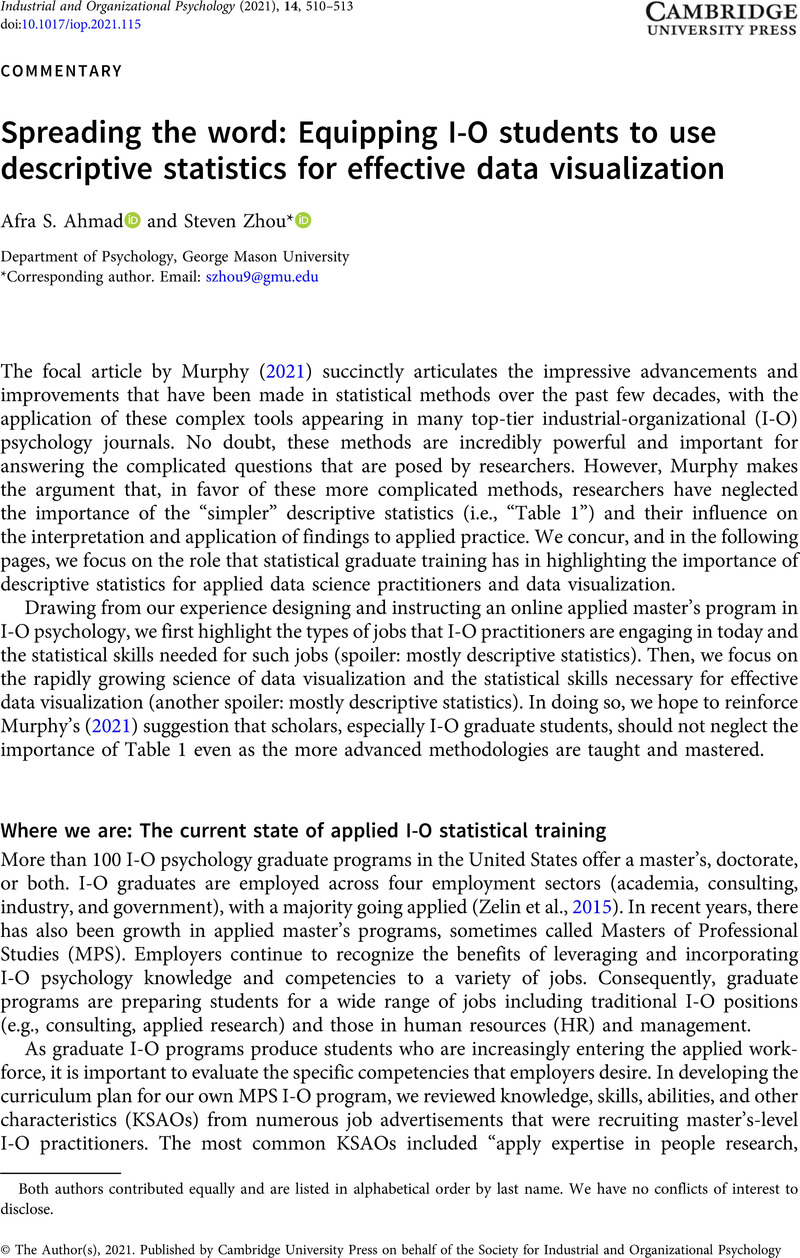No CrossRef data available.
Article contents
Spreading the word: Equipping I-O students to use descriptive statistics for effective data visualization
Published online by Cambridge University Press: 14 December 2021
Abstract
An abstract is not available for this content so a preview has been provided. Please use the Get access link above for information on how to access this content.

- Type
- Commentaries
- Information
- Copyright
- © The Author(s), 2021. Published by Cambridge University Press on behalf of the Society for Industrial and Organizational Psychology
Footnotes
Both authors contributed equally and are listed in alphabetical order by last name. We have no conflicts of interest to disclose.
References
Anderson, N., Herriot, P., & Hodgkinson, G. P. (2001). The practitioner–researcher divide in industrial, work and organizational (IWO) psychology: Where are we now, and where do we go from here? Journal of Occupational and Organizational Psychology, 74(4), 391–411. https://doi.org/10.1348/096317901167451
CrossRefGoogle Scholar
Antonakis, J., Bastardoz, N., & Rönkkö, M. (2021). On ignoring the random effects assumption in multilevel models: Review, critique, and recommendations. Organizational Research Methods, 24(2), 443–483. https://doi.org/10.1177/1094428119877457
CrossRefGoogle Scholar
Aguinis, H., Ramani, R. S., Campbell, P. K., Bernal-Turnes, P., Drewry, J. M., & Edgerton, B. T. (2017). Most frequently cited sources, articles, and authors in industrial-organizational psychology textbooks: Implications for the science-practice divide, scholarly impact, and the future of the field. Industrial and Organizational Psychology: Perspectives on Science and Practice, 10(4), 507–557. https://doi.org/10.1017/iop.2017.69
CrossRefGoogle Scholar
Berinato, S. (2016). Good charts: The HBR guide to making smarter, more persuasive data visualizations. Harvard Business Review Press.Google Scholar
Healy, K. (2018). Data visualization: Apractical introduction. Princeton University Press.Google Scholar
Knaflic, C. N. (2015). Storytelling with data: Adata visualization guide for business professionals. John Wiley & Sons.CrossRefGoogle Scholar
Latham, G. P. (2019). Perspectives of a practitioner-scientist on organizational psychology/organizational behavior. Annual Review of Organizational Psychology and Organizational Behavior, 6, 1–16. https://doi.org/10.1146/annurev-orgpsych-012218-015323
CrossRefGoogle Scholar
Leybzon, D. D. (2020, May 29). Bad data visualization in the time of COVID-19. Medium. Retrieved from https://medium.com/nightingale/bad-data-visualization-in-the-time-of-covid-19-5a9f8198ce3e
Google Scholar
Murphy, K. R. (2021). In praise of table 1: The importance of making better use of descriptive statistics. Industrial and Organizational Psychology: Perspectives on Science and Practice, 14(4), 461–477.Google Scholar
Sawicki, J. (2020, July 28). Why is this chart bad? The ultimate guide to data visualization evaluation using GoDVE (Grammar of Data Visualization Evaluation). Towards Data Science. https://towardsdatascience.com/why-is-this-chart-bad-5f16da298afa
Google Scholar
Society for Industrial and Organizational Psychology (SIOP). (2016). Guidelines for education and training in industrial-organizational psychology. https://www.siop.org/Events-Education/Graduate-Training-Program/Guidelines-for-Education-and-Training
Google Scholar
Society for Industrial and Organizational Psychology (SIOP). (2021). SIOP vision, mission, values, and goals. Retrieved from https://www.siop.org/About-SIOP/Mission
Google Scholar
Zaefarian, G., Kadile, V., Henneberg, S. C., & Leischnig, A. (2017). Endogeneity bias in marketing research: Problem, causes and remedies. Industrial Marketing Management, 65, 39–46. https://doi.org/10.1016/j.indmarman.2017.05.006
CrossRefGoogle Scholar
Zelin, A., Lider, M., & Doverspike, D. (2015). SIOP Career Study Executive Report. Center for Organizational Research, The University of Akron. http://www.siop.org/tip/april15/techreport.pdf
Google Scholar
Zhou, S., & Ahmad, A. (2020). Who’s your audience? Expanding I-O teaching to non-I-O students. Industrial and Organizational Psychology: Perspectives on Science and Practice, 13(4), 585–589. https://doi.org/10.1017/iop.2020.98
CrossRefGoogle Scholar


